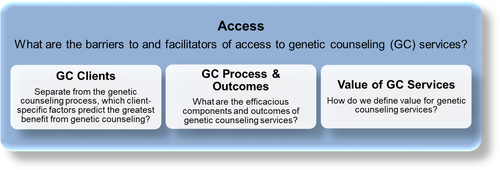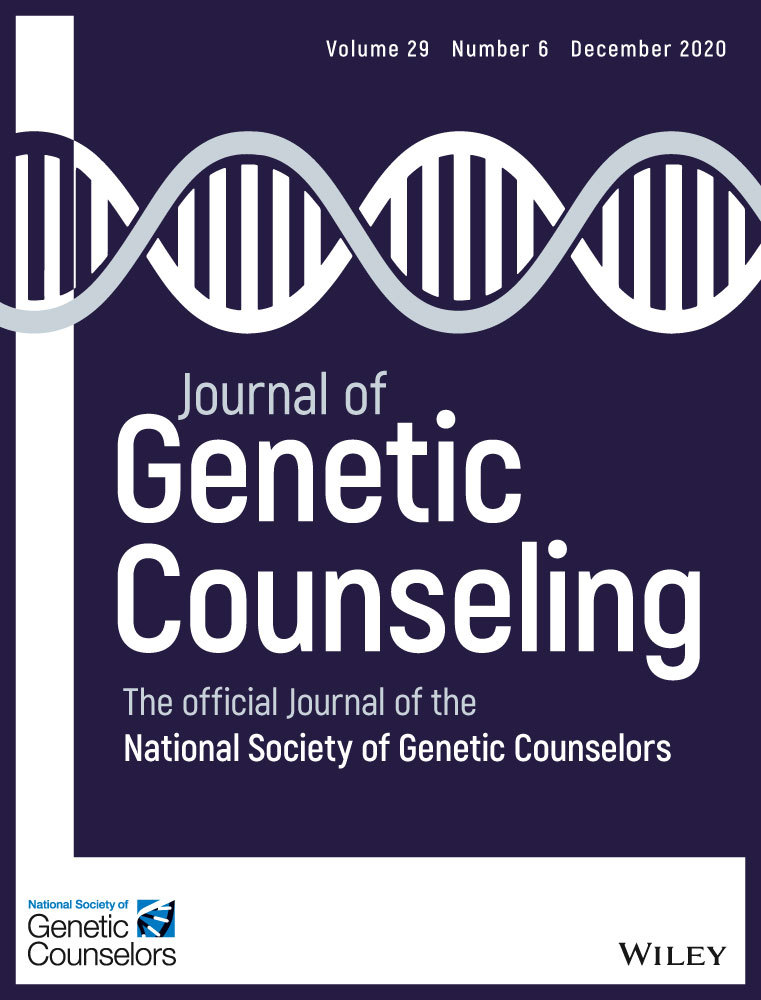Advancing the genetic counseling profession through research: Identification of priorities by the National Society of Genetic Counselors research task force
Abstract
To help advance research critical to the achievement of the National Society of Genetic Counselors’ (NSGC) strategic objectives, coordination and prioritization of society resources are needed. NSGC convened a task force to advance research necessary for the achievement of our strategic objectives by reviewing existing society-supported research efforts identifying gaps in current research, and coordinating society resources, the task force was formed in order to coordinate and prioritize society resources to advance research critical to the achievement of our strategic objectives. The task force developed a research agenda outlining high-priority research questions for the next 5 years. The questions are organized into four domains: (a) Genetic Counseling Clients; (b) Genetic Counseling Process and Outcomes; (c) Value of Genetic Counseling Services; and (d) Access to Genetic Counseling Services. This framework can be used to advocate for research and funding priorities within NSGC and with other key research entities to stimulate the growth and advancement of the genetic counseling profession.
1 BACKGROUND ON THE NATIONAL SOCIETY OF GENETIC COUNSELORS
The National Society of Genetic Counselors (NSGC) is a professional organization that represents genetic counselors worldwide in all areas of practice and aims to advance the various roles of genetic counselors in health care by fostering education, research, and public policy to ensure the availability of quality genetic services. The strategic initiatives and priorities of the organization are guided by the 2019–2021 Strategic Plan (National Society of Genetic Counselors, 2019), which was developed by the NSGC Board of Directors (BOD) in 2018. 'Research' was identified as one of four areas of strategic focus for NSGC, and to carry out the initiatives therein, a Research Task Force was chartered.
2 BACKGROUND ON THE TASK FORCE
The ability to measure genetic counseling outcomes is complicated by a lack of consensus around appropriate measures and critical research questions, leading to a relative lack of data connecting genetic counseling practice to healthcare value, which has been well described (Athens et al., 2017; Cragun & Zierhut, 2018; McAllister, Wood, Dunn, Shiloh, & Todd, 2011; Payne et al., 2008; Wang, Gonzalez, & Merajver, 2004; Williams, 2009). The NSGC BOD realized the need to accelerate research demonstrating the value of genetic counseling provided by genetic counselors. The NSGC BOD chartered the NSGC Research Task Force to develop an organizational research agenda and recommendations for research infrastructure, with the goal of advancing research critical to the achievement of NSGC strategic initiatives. The task force initiated their work in March 2019 and included representatives from NSGC committees, special interest groups, and advisory groups with expertise in genetic counseling service delivery, clinical practice guidelines, and research.
The task force took inventory of current NSGC-sponsored research activities and funding mechanisms, identified global knowledge gaps that impede the NSGC’s strategic progress, and developed a set of recommendations and research priorities for the organization and genetic counseling profession as a whole. Here, we describe the process and conclusions of the task force.
3 A RESEARCH AGENDA TO ADVANCE THE PROFESSION
As an initial step to developing NSGC’s research agenda, task force members were asked to identify research gaps which would advance the practice and training of genetic counselors, the growth, evolution, and application of genetic counseling, and the reimbursement of genetic counseling services. Task force members submitted important research questions, and a list of questions was further developed during discussion among the members. This list of questions was coalesced with the long-term vision of the profession and the 2019–2021 NSGC strategic plan, and four key areas emerged to serve as the overall framework for NSGC’s research agenda (see Figure 1).

- ● Necessary to advance or accomplish the goals in the NSGC strategic plan;
- ● critical from a sequential perspective (i.e., questions that need to be answered before the organization can move on to other important questions); and/or
- ● time-sensitive because of current or anticipated outside forces, events, or policies that could impact genetic counselor practice.
Here, we list the twenty key questions as they were mapped to the framework. Their order of appearance does not indicate priority.
4 TWENTY KEY QUESTIONS
4.1 Genetic counseling clients
- What clinical, psychological, behavioral, and/or social factors predict need for and/or benefit from genetic counseling?
- Are there specific times in an individual’s life cycle where genetic counseling is more beneficial (e.g., globally by life milestones or before diagnosis and testing, immediately after, some period after)?
- What clinical, psychological, behavioral, and/or social factors are associated with health disparities as they pertain to genetic counseling and testing?
4.2 Genetic counseling process and outcomes
- What are the common and specific elements of genetic counseling models, and what are the critical/most efficacious components of these models?
- How do we enable genetic counselors to practice more effectively and at the top of their scope (e.g., using electronic medical records, genetic counseling assistants/extenders, video information, questionnaire, chatbots)?
- How does the changing landscape of access to genetic testing affect genetic counseling models and scope?
- What are, and how do we measure, the psychological, behavioral, medical, interpersonal, and economic outcomes of genetic counseling?
- Which genetic counseling interventions and approaches promote positive psychological, behavioral, medical, interpersonal, economic (and/or other) outcomes and mitigate negative outcomes?
4.3 Value
- How do we define value in genetic counseling? What are the relevant variables and components of the value equation? [e.g., Value = Quality/Cost? or Value = (Safety + Efficacy + Patient Experience)/(Costs incurred − Costs avoided), other?]
- What are the quality differentiators within delivery of genetic counseling services? (i.e., process + outcome = quality)
- What is the value added of services provided by a genetic counselor (compared to no genetic counselor or a non-genetic counselor provider)? It is important to assess genetic counseling services in non-direct patient care roles as well.
- How do licensure and payer coverage policies affect quality of services provided (to patients, health systems, and communities), billing and reimbursement, healthcare costs, and other policies?
- What is the impact of genetic counseling on the quality and cost of downstream health care?
- What are the costs incurred and costs avoided resulting from delivery of genetic services by a genetic counselor?
- What are the comparative costs and benefits of different genetic counseling service delivery models?
- How do consumers weigh the relative value of genetic counseling against other healthcare costs?
4.4 Access
- Which policies reduce barriers/promote access to genetic counseling services and how?
- What are the barriers/facilitators to providing genetic counseling services to minority and medically underserved populations?
- What are the common pathways and referral patterns to genetic counseling?
- How does the changing landscape of access to genetic testing impact the entry points to genetic counseling services?
5 SUMMARY
The NSGC is committed to using these questions supporting genetic counselor value to guide discussions around new organizational initiatives and the revision of existing programs. The overarching objective of this research agenda is to promote evidence-based practice in genetic counseling in order to bring significant and demonstrable value to our clients and to the healthcare system as a whole. We recognize that regional and international differences in genetic counseling practice will impact the context within which these research questions are answered and we value varied perspectives in this regard. We encourage genetic counselors, genetic counseling graduate students, and researchers from multiple fields to design projects with these questions in mind.
6 WHERE THIS WILL LEAD
The overarching objective of this research agenda is to promote evidence-based practice in genetic counseling in order to bring significant and demonstrable value to our clients and to the healthcare system as a whole. Addressing the 20 key questions will advance the field of genetic counseling and benefit both our clients and the healthcare system.
AUTHOR CONTRIBUTIONS
Leigha Senter, Meghan Carey, and Gillian Hooker involved in conceptualization, methodology, project administration, writing—original draft, and review and editing. Jehannine Austin, Megan Cho, Stephanie Harris, Erin Linnenbringer, Ian MacFarlane, Vivian Pan, John Quillin, and Julia Wynn involved in project administration, review of manuscript drafts, and editing.
ACKNOWLEDGEMENT
This work was supported by the National Society of Genetic Counselors.
COMPLIANCE WITH ETHICAL STANDARDS
Conflict of interest
Leigha Senter, Jehannine Austin, Meghan Carey, Megan Cho, Stephanie Harris, Erin Linnenbringer, Ian MacFarlane, Vivian Pan, John Quillin, Julia Wynn, and Gillian Hooker declare they have no relevant conflicts of interest.
Human studies and informed consent
This work did not involve human subjects research.
Animal studies
No non-HUMAN studies were carried out by authors for this article.
Data sharing and data accessibility
No data were generated through this report.




